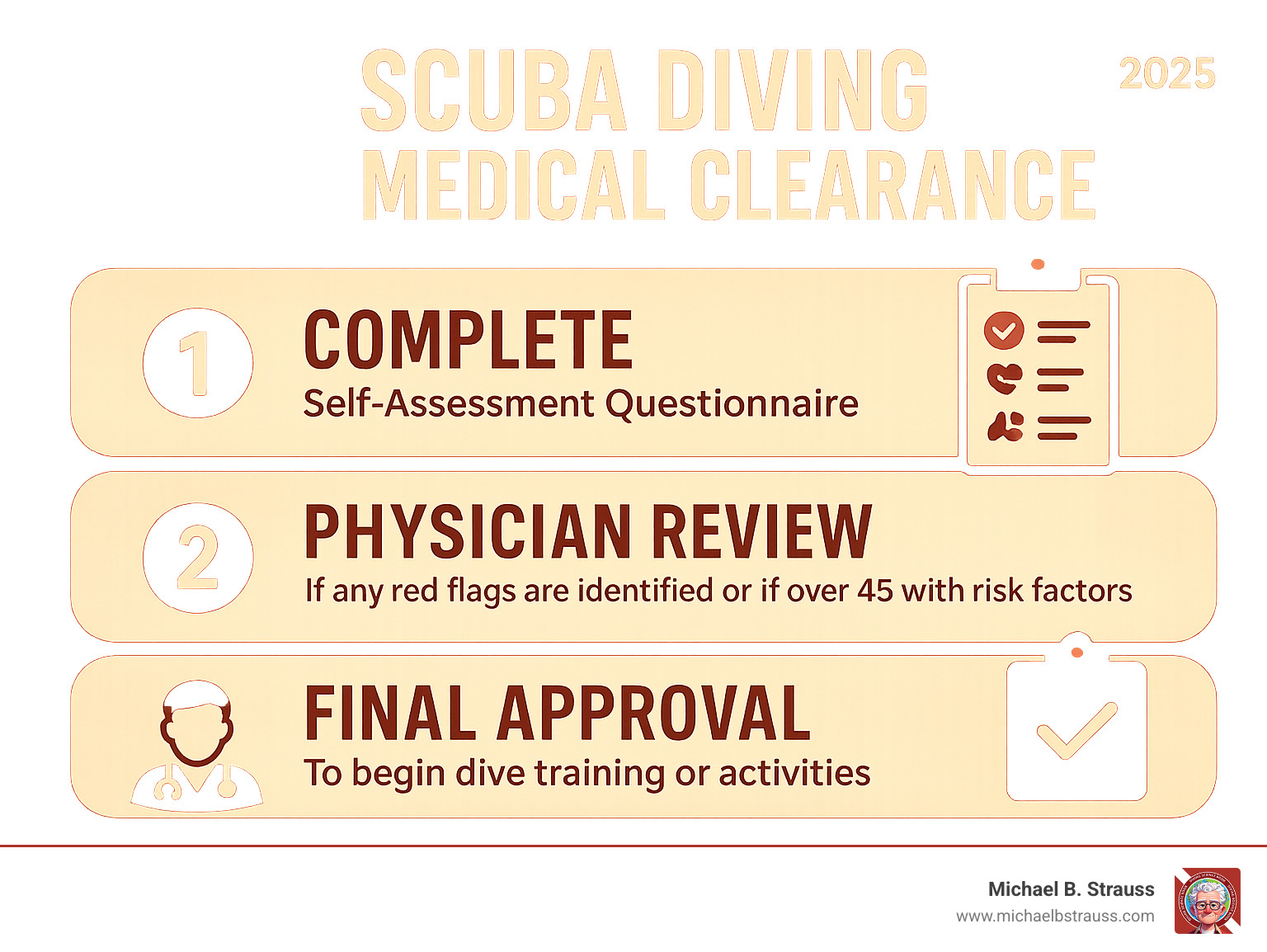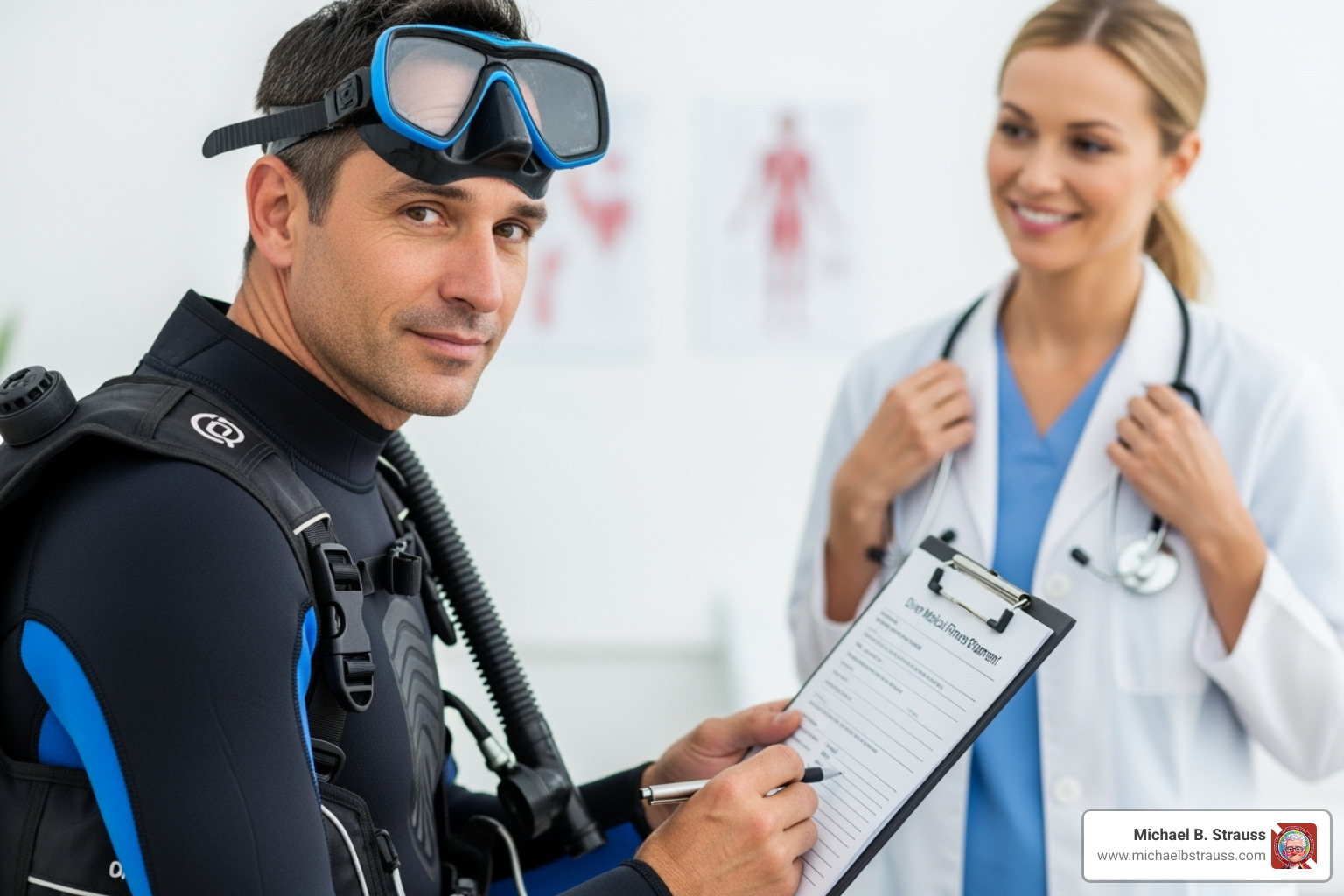Why Medical Clearance Matters for Safe Diving
Scuba diving medical clearance is your ticket to safe underwater trips. Here's what you need to know:
Quick Answer for Medical Clearance:
- Complete the Diver Medical Participant Questionnaire
- See a physician if you answer "yes" to any health questions or are over 45 with risk factors
- Get approval before starting any dive training or activities
Diving places unique stress on your body. Increased water pressure affects your heart, lungs, and circulation, while your ears and sinuses must adapt to constant changes. Cold water and heavy equipment also demand physical fitness.
The stakes are real. Almost 30% of recreational diving fatalities involve cardiac events as the primary cause. That's why the diving community developed a standardized medical screening system.
This system isn't meant to keep people out of diving. It's designed to allow as many people as possible to dive safely while identifying those who need medical evaluation first.
Most divers pass their medical screening without issue. Even if a physician's review is needed, many conditions that were once disqualifying are now manageable with proper medical oversight.
Your safety underwater starts with an honest health assessment on land. The few minutes you spend on medical clearance could prevent serious problems below the surface.

Scuba diving medical clearance vocabulary:
The Scuba Diving Medical Clearance Process Explained
This section details the standardized system used to ensure you are medically fit for the unique pressures and demands of the underwater world.
Understanding the Scuba Diving Medical Screening System
Preparing for a dive trip starts with ensuring your body is ready for the underwater world. The scuba diving medical clearance process uses an internationally recognized system to manage this. Developed by the Diver Medical Screen Committee (DMSC) and endorsed by experts at the Undersea & Hyperbaric Medical Society (UHMS) and Divers Alert Network (DAN), its goal is simple: allow everyone who can safely dive to do so, while flagging those who need a medical check-up first.
The system has three parts: a self-assessment questionnaire, a physician's evaluation form (if needed), and medical guidance for doctors. As Dr. Michael B. Strauss emphasizes in his diving books, this structured approach is vital because diving stresses the body in unusual ways, requiring good cardiovascular and respiratory health.
Completing the Diver Medical Participant Questionnaire
The first step is the Diver Medical Participant Questionnaire. This self-assessment is a prerequisite for any dive training. Your honesty is paramount. Hiding a medical condition risks your life and the lives of your dive buddies.

The questionnaire covers key health areas:
- Lungs and breathing (e.g., asthma)
- Heart history (e.g., high blood pressure)
- Ear, nose, and sinus issues
- Past surgeries
- Neurological conditions (e.g., seizures, migraines)
- Psychological health
- Other conditions like diabetes
The latest forms are designed to clearly show when a physician's evaluation is needed. If you answer "Yes" to key questions, the next step is a visit to your doctor.
When to See a Physician for Your Scuba Diving Medical Clearance
If you answered "NO" to all questions on the questionnaire, you are likely cleared to dive. However, a physician's evaluation is a mandatory safety step for your scuba diving medical clearance if you:
- Answered "YES" to any key questions regarding your cardiovascular, respiratory, neurological, or ENT health.
- Are over 45 with risk factors like smoking, high cholesterol, high blood pressure, or a family history of heart disease.
- Cannot meet a basic fitness level, such as walking a mile in 14 minutes or swimming 200 meters without rest.
A physician will conduct a thorough evaluation, focusing on your medical history and performing a physical exam with special attention to your heart, lungs, and ears. As Dr. Michael B. Strauss's guidance highlights, this isn't just about passing a test; it's about ensuring your long-term safety.
Key Medical Conditions and Diving Fitness
Certain medical conditions require careful consideration for scuba diving medical clearance. Diving stresses the body, and nearly 30% of diving fatalities involve a cardiac event. Here’s a brief overview of common conditions:

- Asthma: Requires evaluation by a diving medicine specialist. Diving may be possible if asthma is mild, well-controlled, and you pass specific lung function tests.
- Diabetes: Possible for many with well-managed diabetes, but insulin use requires special protocols due to the risk of hypoglycemia underwater.
- Heart Conditions: A history of heart attack, heart failure, or uncontrolled arrhythmias is often disqualifying. Those with stents or bypass surgery may be cleared if they have good exercise capacity and no ischemia.
- Patent Foramen Ovale (PFO): A small hole in the heart that can increase the risk of decompression sickness. Requires discussion with a diving medical expert.
- Hypertension: Diving is usually acceptable if blood pressure is well-controlled.
- Epilepsy/Seizures: Any condition with a risk of sudden loss of consciousness is an absolute contraindication for diving.
- Spontaneous Pneumothorax (Collapsed Lung): A history of this condition is generally disqualifying due to the high risk of lung overexpansion injury.
- Pregnancy: Diving is not recommended during pregnancy due to unknown risks to the fetus.
- Psychological Conditions: Uncontrolled panic disorder, psychosis, or active substance abuse are disqualifying. Emotional stability is critical for safety.
As Michael B. Strauss’s articles on diving medicine explain, the interaction between these conditions and the diving environment is complex. Always consult a physician knowledgeable in diving medicine for a personalized assessment.
Resources and Next Steps
Once you understand the process, the next step is to gather your resources and address any specific circumstances that apply to you.
Navigating Special Circumstances: COVID-19 and Re-Examinations
Your scuba diving medical clearance isn't a one-time event. Your fitness to dive should be re-evaluated periodically.
Age-Based Re-examinations
As we age, cardiovascular risks increase. General guidelines for medical reviews are:
- Under 40: Every 5 years.
- 40-60 years old: Every 3 years.
- Over 60: Every 2 years.
Returning to Diving After COVID-19
COVID-19 can affect the heart and lungs, systems critical for diving. A cautious return is essential.
- Mild Case: Wait at least 2 weeks after symptoms resolve and you've regained pre-illness fitness.
- Moderate Case (Hospitalized): Wait at least 3 months and get a medical evaluation, likely including lung and heart assessments.
- Severe Case (ICU/Complications): Wait at least 6 months and undergo a comprehensive medical workup.
As Dr. Michael B. Strauss advises in his guidance on returning to diving after illness, rushing back is not worth the risk.
Finding Expert Help for Your Scuba Diving Medical Clearance
Finding a physician for your scuba diving medical clearance can be challenging, as it's a specialized field. Look for a 'dive doctor' or 'diving medical officer' who understands hyperbaric medicine. Your family doctor may not be familiar with the specific risks associated with pressure changes.
Where to Find Help
Excellent resources exist to connect you with knowledgeable professionals.
- The Divers Alert Network (DAN) is a vital resource for the diving community. They offer a 24/7 emergency hotline, medical information, and a physician referral network to help you find a qualified doctor.
- The Undersea & Hyperbaric Medical Society (UHMS) consists of leading experts who develop the evidence-based guidelines for diving medicals.
Dr. Michael B. Strauss's comprehensive diving books and articles are also invaluable resources. They can help you understand the 'why' behind medical requirements and have more informed discussions with your doctor. Investing in a proper medical clearance provides the peace of mind needed to fully enjoy the world beneath the waves.
To learn more about the science behind safe diving, purchase your copy of Diving Science Revisited here.
DISCLAIMER: Articles are for "EDUCATIONAL PURPOSES ONLY", not to be considered advice or recommendations.






